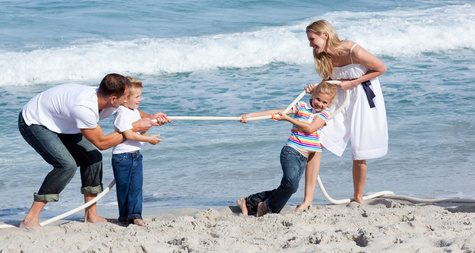Children…curiosity…exploration…constant q uestioning. These words seem almost synonymous, don’t they? In fact, children love to explore. They have an incessant curiosity that leads them to actively investigate everything around them. They explore things with their eyes, ears, hands, and even mouth. Like miniature scientists they study the world around them to discover “how” and “why” things happen the way they do.
uestioning. These words seem almost synonymous, don’t they? In fact, children love to explore. They have an incessant curiosity that leads them to actively investigate everything around them. They explore things with their eyes, ears, hands, and even mouth. Like miniature scientists they study the world around them to discover “how” and “why” things happen the way they do.
 uestioning. These words seem almost synonymous, don’t they? In fact, children love to explore. They have an incessant curiosity that leads them to actively investigate everything around them. They explore things with their eyes, ears, hands, and even mouth. Like miniature scientists they study the world around them to discover “how” and “why” things happen the way they do.
uestioning. These words seem almost synonymous, don’t they? In fact, children love to explore. They have an incessant curiosity that leads them to actively investigate everything around them. They explore things with their eyes, ears, hands, and even mouth. Like miniature scientists they study the world around them to discover “how” and “why” things happen the way they do. In the midst of all this curiosity and exploration, do you know what interests children most? You do! They want to know everything about you, their parent–what interests you, what holds your attention, what arouses your emotions. That’s why your infant wants to play with the cell phone you spend so much time looking at or the pots and pans you spend the hour before dinner using. A child’s curiosity also leads him to ask you unending questioning–“What are you doing?” “What’s that?” “How’s that work?” “What’s that do?” “Why?” Sometimes this curious desire to know leads them to engage in somewhat irritating behaviors like flipping the light switch on and off to learn about cause and effect, or, throwing their spoon on the ground to see how much they can get you to do. As they get older, their curiosity encourages them to chase after ants with a magnifying glass to look at their magnified image and learn about nature. Even a teen’s curiosity leads to behavior we sometimes questions, like “doing donuts” in a snowy parking lot or setting a firecracker off in a model car. They want to know about everything…especially those things that interest you. This incessant desire to learn about the world may even lead to behavior you don’t particularly like. I remember learning how to make a “washtub bass guitar.” I loved music and the excitement of making my own instrument overwhelmed me. Curiosity and excitement led me to drill a hole in the bottom of my parents’ only washtub basin, cut off the whisk-end of the broom, and connect them with a string. The resulting music sounded good to me…my parents disagreed. I ended up playing the blues in my room for a time.
All kidding aside, curiosity helps children learn. More importantly, a child finds the most pleasure in exploring when they can share that exploration with a parent. As a parent responds with supportive comments and shared excitement, their child gains pleasure, finds that learning is fun, and grows more confident in their ability to meet and conquer challenges. I love this table developed by Dr. Bruce Duncan Perry, MD, PhD, that shows curiosity ultimately leads to greater confidence and more exploration. Limit their curiosity and you ultimately limit their mastery, confidence, and even sense of security.
|
Curiosity
|
results in
|
Exploration
|
results in
|
Discovery
|
|
Discovery
|
results in
|
Pleasure
|
results in
|
Repetition
|
|
Repetition
|
results in
|
Mastery
|
results in
|
New Skills
|
|
New Skills
|
results in
|
Confidence
|
results in
|
Self Esteem
|
|
Self Esteem
|
results in
|
Sense of Security
|
results in
|
More Exploration
|
Children are curious, but they are also immature and inexperienced. As family  shepherds, we have to watch them and protect them while encouraging appropriate exploration. That demands that we accept their curiosity and their immaturity as natural. We need not yell and scream at them for immaturity. No, immaturity calls us to teach them. Their immaturity invites us to be present with them in their curiosity, invest our time in their exploration, and share in the excitement of their discovery. By remaining present with them in their curiosity, we can address any concerns that might arise. When they become disruptive, our presence will teach them how to explore in a more appropriate manner. Investing our time in their exploration allows us to help channel that exploration in appropriate venues. We can teach them that the library is not the place to explore sound, but the music room is…late at night is not the best time to practice rock riffs on the electric guitar, but early evening is…the house is not the best place to explore the properties of flying water, but the yard is. By sharing in their excitement we teach them that exploration is valuable, learning is fun, and discovery is good. A parent who shares in the excitement of their child’s discovery will find ways to promote exploration and curiosity rather than saying “don’t touch,” “don’t climb,” “don’t take that apart,” “don’t get dirty.” That may mean setting some boundaries around the curiosity. For instance, letting your child know that playing in the mud may be fun, but they have to change clothes before stomping through the living room…playing with the condensation on the window is interesting, but they will need to help clean the fingerprints off the window when all is said and done. And, while they help you clean up, you have the opportunity to talk about the exciting discoveries made during play.
shepherds, we have to watch them and protect them while encouraging appropriate exploration. That demands that we accept their curiosity and their immaturity as natural. We need not yell and scream at them for immaturity. No, immaturity calls us to teach them. Their immaturity invites us to be present with them in their curiosity, invest our time in their exploration, and share in the excitement of their discovery. By remaining present with them in their curiosity, we can address any concerns that might arise. When they become disruptive, our presence will teach them how to explore in a more appropriate manner. Investing our time in their exploration allows us to help channel that exploration in appropriate venues. We can teach them that the library is not the place to explore sound, but the music room is…late at night is not the best time to practice rock riffs on the electric guitar, but early evening is…the house is not the best place to explore the properties of flying water, but the yard is. By sharing in their excitement we teach them that exploration is valuable, learning is fun, and discovery is good. A parent who shares in the excitement of their child’s discovery will find ways to promote exploration and curiosity rather than saying “don’t touch,” “don’t climb,” “don’t take that apart,” “don’t get dirty.” That may mean setting some boundaries around the curiosity. For instance, letting your child know that playing in the mud may be fun, but they have to change clothes before stomping through the living room…playing with the condensation on the window is interesting, but they will need to help clean the fingerprints off the window when all is said and done. And, while they help you clean up, you have the opportunity to talk about the exciting discoveries made during play.
 shepherds, we have to watch them and protect them while encouraging appropriate exploration. That demands that we accept their curiosity and their immaturity as natural. We need not yell and scream at them for immaturity. No, immaturity calls us to teach them. Their immaturity invites us to be present with them in their curiosity, invest our time in their exploration, and share in the excitement of their discovery. By remaining present with them in their curiosity, we can address any concerns that might arise. When they become disruptive, our presence will teach them how to explore in a more appropriate manner. Investing our time in their exploration allows us to help channel that exploration in appropriate venues. We can teach them that the library is not the place to explore sound, but the music room is…late at night is not the best time to practice rock riffs on the electric guitar, but early evening is…the house is not the best place to explore the properties of flying water, but the yard is. By sharing in their excitement we teach them that exploration is valuable, learning is fun, and discovery is good. A parent who shares in the excitement of their child’s discovery will find ways to promote exploration and curiosity rather than saying “don’t touch,” “don’t climb,” “don’t take that apart,” “don’t get dirty.” That may mean setting some boundaries around the curiosity. For instance, letting your child know that playing in the mud may be fun, but they have to change clothes before stomping through the living room…playing with the condensation on the window is interesting, but they will need to help clean the fingerprints off the window when all is said and done. And, while they help you clean up, you have the opportunity to talk about the exciting discoveries made during play.
shepherds, we have to watch them and protect them while encouraging appropriate exploration. That demands that we accept their curiosity and their immaturity as natural. We need not yell and scream at them for immaturity. No, immaturity calls us to teach them. Their immaturity invites us to be present with them in their curiosity, invest our time in their exploration, and share in the excitement of their discovery. By remaining present with them in their curiosity, we can address any concerns that might arise. When they become disruptive, our presence will teach them how to explore in a more appropriate manner. Investing our time in their exploration allows us to help channel that exploration in appropriate venues. We can teach them that the library is not the place to explore sound, but the music room is…late at night is not the best time to practice rock riffs on the electric guitar, but early evening is…the house is not the best place to explore the properties of flying water, but the yard is. By sharing in their excitement we teach them that exploration is valuable, learning is fun, and discovery is good. A parent who shares in the excitement of their child’s discovery will find ways to promote exploration and curiosity rather than saying “don’t touch,” “don’t climb,” “don’t take that apart,” “don’t get dirty.” That may mean setting some boundaries around the curiosity. For instance, letting your child know that playing in the mud may be fun, but they have to change clothes before stomping through the living room…playing with the condensation on the window is interesting, but they will need to help clean the fingerprints off the window when all is said and done. And, while they help you clean up, you have the opportunity to talk about the exciting discoveries made during play.Enjoy your children’s curiosity. Nurture and participate in their exploration. Celebrate their discoveries. They will grow in wisdom and confidence. Most importantly, you will both enjoy a deeper and more intimate connection as you explore your child’s curiosity together.

 their parents’ supportive cash for gas money and money to go out with friends. It is a very confusing time—for teens and parents. As parents, we want what is best for our teens. We hope they will accept the wisdom of our experience as they navigate the transition into adulthood. Unfortunately, they do not always heed our words…at least not to our faces. So, when it comes to dealing with teens, here are a couple helpful ideas.
their parents’ supportive cash for gas money and money to go out with friends. It is a very confusing time—for teens and parents. As parents, we want what is best for our teens. We hope they will accept the wisdom of our experience as they navigate the transition into adulthood. Unfortunately, they do not always heed our words…at least not to our faces. So, when it comes to dealing with teens, here are a couple helpful ideas.  nnouncing medication side effects on various TV commercials). Having clear rules that are consistently enforced may result in increased arguing and complaining. In fact, those families with the least amount of deception often had a higher rate of arguing and complaining. That is great! No really, it is great. A moderate amount of arguing between parent and teens (emphasize the word moderate) results in better adjustment than no arguing or frequent arguing. Arguing allows the teen to see their parent in a new light, to hear the argument for the rules clearly articulated and “reasoned out.” In the teens’ effort to become independent and take on “their own values,” they can listen to their parents articulate the rules they have grown up with before internalizing them as their own. In a sense, the teen who complains and argues is saying, “I know you have always kept this rule; but now I want to know why. Do you really believe it? What makes it such a good rule?” In the midst of this argument, teens assert their growing independence while exploring the values they have grown up with.
nnouncing medication side effects on various TV commercials). Having clear rules that are consistently enforced may result in increased arguing and complaining. In fact, those families with the least amount of deception often had a higher rate of arguing and complaining. That is great! No really, it is great. A moderate amount of arguing between parent and teens (emphasize the word moderate) results in better adjustment than no arguing or frequent arguing. Arguing allows the teen to see their parent in a new light, to hear the argument for the rules clearly articulated and “reasoned out.” In the teens’ effort to become independent and take on “their own values,” they can listen to their parents articulate the rules they have grown up with before internalizing them as their own. In a sense, the teen who complains and argues is saying, “I know you have always kept this rule; but now I want to know why. Do you really believe it? What makes it such a good rule?” In the midst of this argument, teens assert their growing independence while exploring the values they have grown up with.  who will teach them right from wrong and hold them accountable to those standards. They benefit from parents that will support them and advocate for them when necessary. However, in our child-centered culture, some parents have become what many lovingly refer to as “the helicopter parent.” You know who they are…perhaps you have even played the role of a helicopter parent yourself. Unfortunately, playing the helicopter parent carries a cost for you and your children. So, are you a helicopter parent? If so, what are the costs of hovering over our children?
who will teach them right from wrong and hold them accountable to those standards. They benefit from parents that will support them and advocate for them when necessary. However, in our child-centered culture, some parents have become what many lovingly refer to as “the helicopter parent.” You know who they are…perhaps you have even played the role of a helicopter parent yourself. Unfortunately, playing the helicopter parent carries a cost for you and your children. So, are you a helicopter parent? If so, what are the costs of hovering over our children?  strengths and weaknesses. They learn that momentary failure or disappointment is not the end of the world, but an opportunity to learn, grow, and persist. This leads to greater resilience and strength, persistence and fortitude. A little failure never hurt anyone…some might even say that learning to manage setbacks actually “makes the man.” Like Einstein, Edison, or Lincoln, a child who experiences momentary setbacks can achieve more than their peers who were rescued from setbacks and, as a result, never learned to persist.
strengths and weaknesses. They learn that momentary failure or disappointment is not the end of the world, but an opportunity to learn, grow, and persist. This leads to greater resilience and strength, persistence and fortitude. A little failure never hurt anyone…some might even say that learning to manage setbacks actually “makes the man.” Like Einstein, Edison, or Lincoln, a child who experiences momentary setbacks can achieve more than their peers who were rescued from setbacks and, as a result, never learned to persist.  a son asks his father for his inheritance. This loving father gives his son his inheritance, no questions asked. The son leaves home and blows the whole thing on wasteful living. He ends up broke, without friends, and working one of the lowliest, dirtiest jobs possible. Of course, he eventually “comes to his senses” and returns home expecting to become a servant in his father’s house. Instead, he finds a compassionate, gracious father who restores his status and position in the family. I have always loved contemplating the father’s loving response when the prodigal returns home. However, this time I was captivated by the father’s actions during the prodigal son’s time away. Think about it. The prodigal son’s father may have known how his son wasted his money. He likely knew that his son was lonely, broke, working in a pig pen, and longing to eat the pig’s food.
a son asks his father for his inheritance. This loving father gives his son his inheritance, no questions asked. The son leaves home and blows the whole thing on wasteful living. He ends up broke, without friends, and working one of the lowliest, dirtiest jobs possible. Of course, he eventually “comes to his senses” and returns home expecting to become a servant in his father’s house. Instead, he finds a compassionate, gracious father who restores his status and position in the family. I have always loved contemplating the father’s loving response when the prodigal returns home. However, this time I was captivated by the father’s actions during the prodigal son’s time away. Think about it. The prodigal son’s father may have known how his son wasted his money. He likely knew that his son was lonely, broke, working in a pig pen, and longing to eat the pig’s food.  l son could have sent his son a sum of money with a note attached—”Son, I know that times are hard so I sent you some money to help make ends meet. You are always welcome home.” What do you think the son would have done if he had received money from his father? Most likely, he would have wasted that money on “crazy living,” just like he did with the inheritance. The father’s bail out would have robbed his son of the opportunity to learn from his mistakes. This temporary relief would have led to more long-term suffering. On a lesser note, the father would have lost more money. More significantly, the father would have to watch his son continue to spiral out of control and suffer the consequences of bad choices.
l son could have sent his son a sum of money with a note attached—”Son, I know that times are hard so I sent you some money to help make ends meet. You are always welcome home.” What do you think the son would have done if he had received money from his father? Most likely, he would have wasted that money on “crazy living,” just like he did with the inheritance. The father’s bail out would have robbed his son of the opportunity to learn from his mistakes. This temporary relief would have led to more long-term suffering. On a lesser note, the father would have lost more money. More significantly, the father would have to watch his son continue to spiral out of control and suffer the consequences of bad choices.  ring…and maybe even calling out a few names. Unfortunately, his son would have quit listening. Once again, the father would have robbed his son of any opportunity to learn from his mistakes. His son would turn his focus onto his father’s behavior…”This is why I left in the first place;” “all he ever does is yell at me;” “I can never satisfy him;” “I don’t know why I ever came back I the first place.” In the midst of all this, the son would never consider his own inappropriate misbehavior. By redirecting the son’s focus from his own misbehavior to the father’s emotional pouncing, the father would have successfully robbed his son of the opportunity to learn. His son may have even turned around and returned to the pig pen while the father continued to lecture and yell.
ring…and maybe even calling out a few names. Unfortunately, his son would have quit listening. Once again, the father would have robbed his son of any opportunity to learn from his mistakes. His son would turn his focus onto his father’s behavior…”This is why I left in the first place;” “all he ever does is yell at me;” “I can never satisfy him;” “I don’t know why I ever came back I the first place.” In the midst of all this, the son would never consider his own inappropriate misbehavior. By redirecting the son’s focus from his own misbehavior to the father’s emotional pouncing, the father would have successfully robbed his son of the opportunity to learn. His son may have even turned around and returned to the pig pen while the father continued to lecture and yell.
 family members will even suffer for the lazy or misbehaving person. For instance, the parent who stays up late to complete their child’s project while the child watches TV or goes to bed. In grace-manipulating families, people learn that anger is stronger than love and comfort more important than character. Unfortunately, the family becomes enslaved to the one who is most willing to manipulate grace.
family members will even suffer for the lazy or misbehaving person. For instance, the parent who stays up late to complete their child’s project while the child watches TV or goes to bed. In grace-manipulating families, people learn that anger is stronger than love and comfort more important than character. Unfortunately, the family becomes enslaved to the one who is most willing to manipulate grace.
